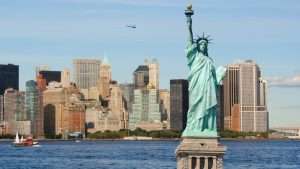The Volokh Conspiracy
Mostly law professors | Sometimes contrarian | Often libertarian | Always independent
Cato Unbound Symposium on "Immigration and Institutions"
The symposium includes contributions by Ben Powell, Peter Skerry, Eric Kaufman, and me.

This month, the Cato Unbound website is hosting an online symposium on "Immigration and Institutions." The lead essay by economist Benjamin Powell is here. It is based, in large part, on his excellent book Wretched Refuse: The Political Economy of Immigration and Institutions (coauthored with Alex Nowrasteh). In my view, theirs is the best and most sophisticated analysis of this important issue.
My response essay was posted earlier today. Here is an excerpt:
There are many possible justifications for immigration restrictions. But perhaps the most potent is the fear that too much immigration of the wrong kind might kill the goose that laid the golden eggs that make a nation attractive to migrants in the first place. Immigrants who do not value liberal democratic institutions or do not understand them might end up destroying them…. In the worst-case scenario, immigrants from nations with horrendous governments might simply replicate those same regimes in their new homes.
Alex Nowrasteh and Benjamin Powell's book Wretched Refuse? The Political Economy of Immigration and Institutions is the most thorough and compelling refutation of such fears to date. As the authors painstakingly show, far from damaging the institutions of free societies, immigration poses little threat to them, and sometimes it makes them stronger.
I agree with nearly all of their major points and analysis. So I will focus on two important related issues that the authors largely leave out. First, Nowrasteh and Powell's book focuses almost entirely on possible negative effects caused by the immigrants themselves. But it is also possible that institutional damage can be inflicted by natives' reactions to immigration, even if those reactions are irrational or unnecessary. Thus, some argue that we need to restrict immigration not to protect natives from immigrants, but to protect natives against themselves.
Second, what if Nowrasteh and Powell are wrong, at least in some cases, and immigration does damage political institutions after all? Even in that worst-case scenario, immigration restrictions still might be unjustified. Instead, we should first consider whether the problem can be alleviated by less draconian measures.
I discuss many of the issues covered in this response essay in greater detail in Chapter 6 of my book Free to Move: Foot Voting, Migration and Political Freedom.
Cato Unbound will also soon post response essays by Prof. Peter Skerry of Boston College, and Prof. Eric Kaufmann of Birkbeck College, University of London. Benjamin Powell will then respond to the commentators, and the discussion will continue over the next two or three weeks.


Show Comments (15)